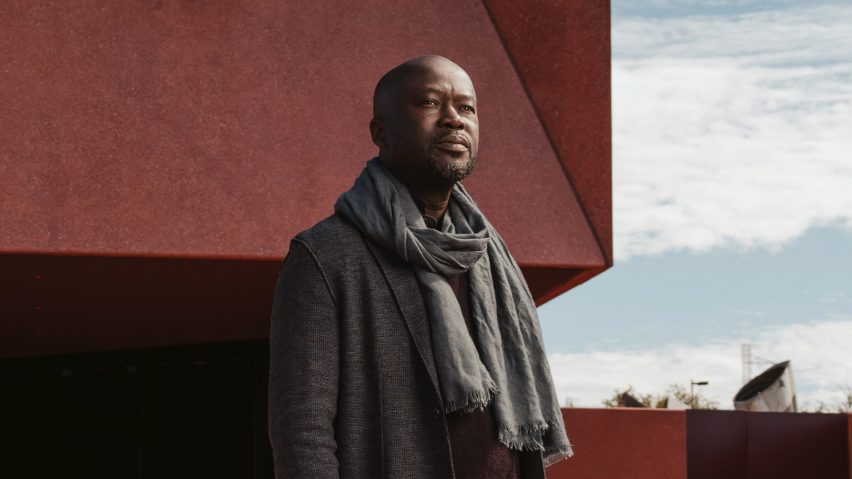The lack of memorials and monuments dedicated to the victims of slavery is leading to ignorance and memory loss, says RIBA Gold Medal-winning architect David Adjaye.
Speaking in a live talk streamed on Dezeen, Adjaye said that "wherever slavery has happened, it has to be dealt with" if society is to move forward.
"[Slavery] is a horrific wound that has just been ignored, and the problem is, it can't heal until you deal with it in some way," explained Adjaye, who was in conversation with graphic designer Michael Bierut and author Spencer Bailey.
The talk was part of a Dezeen x Phaidon collaboration to mark the publication of Bailey's book, In Memory Of: Designing Contemporary Memorials.
Monuments facilitate "cathartic reckoning"
During the talk, Bailey illuminated the lack of memorials around the world that commemorate victims of the slave-trade, despite its significance throughout several centuries and continents.
According to the Ghanaian-British architect, without these tributes, people cannot learn from the past and risk forgetting.
"If you just made a monument to the horror of slavery in every community that it happened, every generation from that community would have to now negotiate that and would know that this was really an issue," said Adjaye.
"It's part of the cathartic reckoning that is critical if your civilisation is to have any credibility in saying that we have learned and have moved on," he explained. "It's not enough to say it."
"The reverse is where you create ignorance, and then an incredible sort of memory loss, which then leads to horrific collisions of culture."
Ignoring history causes "inflammation"
Adjaye attributes the lack of appropriate memorials dedicated to slavery to the "dominant group's desire to not have to confront this horror".
Instead, he says, many people attempt to rewrite history or exonerate the behaviour of their ancestors by stating it was a different period of time.
"One way to do it is to hope that you can rewrite history and, clearly, that does not work, it fails," Adjaye said. "In fact, what you do is that you create a trail of inflammation, which leads back to the fissure of the wound. And that's what's happening," he continued.
"You have to make it part of what you are. The act has happened. History's happened. You can't remove that."
Adjaye comments follow his declaration that "black lives matter" on social media following the death of George Floyd earlier this year, which sparked a global protest about systemic racism.
These protests saw a renewed urgency to confront the legacy of slavery, leading to debates about how the world can pay homage to its victims. In the UK, this reignited a campaign to build a slavery memorial in London and saw a slave trader's statue replaced with a sculpture of a protestor in Bristol.
Berlin shows history can be "physicalised"
Adjaye cites Berlin as a key example of how cities can effectively address painful chapters of human history with memorials.
The German capital is filled with monuments that commemorate World War II and the Holocaust, which serve as a reminder of the conflicts that it has experienced and overcome. By doing so, Adjaye says, its past cannot be avoided or rewritten.
"[Berlin] is a city with layers that are not to do with commercial activity, but to do with civilisation and what civilisation did wrong, but how it is also atoning for it," Adjaye explained.
"It will now be, if I can say it, condemned with this, held by it, but at the same time redeemed by it," he added.
"By having [its history] become so physicalised, there's no more discussion about the fact that it's being dealt with, and that you have to go through it to go to the next stage."
Adjaye designing numerous memorials
Adjaye designed the Making Memory exhibition at the Design Museum in 2019.
The exhibition covered seven major works by Adjaye Associates, including the Smithsonian National Museum of African American History and Culture in Washington DC, which explores America's African heritage and its impact on world history.
The building is conceived as an abstract memorial that references the history of African American craftsmanship and won the Beazley Designs of the Year 2017 for delivering "an emotional experience".
Elsewhere, Adjaye is currently developing the UK Holocaust memorial together with Israeli architect Ron Arad, a tribute to victims of terrorism in Niger and a public monument for a black woman shot by police in Brixton.
In September, Adjaye was awarded the RIBA's Royal Gold Medal 2021, making him the first black architect to win the prize.
The main portrait photo is by Josh Huskin.
In Memory Of: Designing Contemporary Memorials talk took place on 28 October at 5pm UK time. See Dezeen Events Guide for an up-to-date list of architecture and design events taking place around the world.

